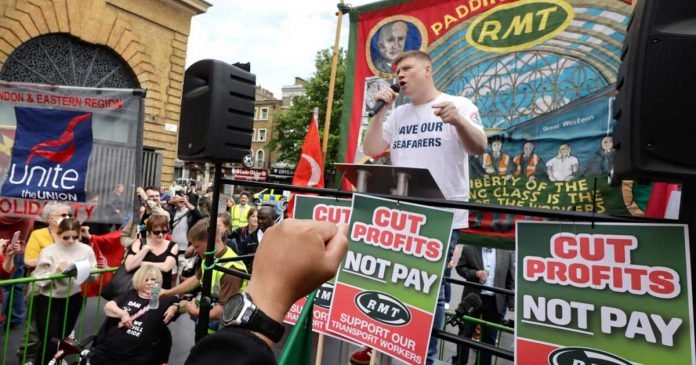

Labor Notes
While the Labour Party offers milquetoast solutions to the cost-of-living crisis and displays outright confusion over whether it backs striking workers, the unions are setting the opposition agenda, writes Marcus Barnett.
In Britain today, anyone asking a worker about the direction the country is headed will be unlikely to receive a printable answer.
Stumbling from crisis to crisis, the country is on its third prime minister of the year. Energy bills have skyrocketed by 96 percent since last winter, and rent has shot up by as much as 20 percent, while inflation — which currently stands at 12.3 percent — has been predicted to rise as high as 18 percent by the first few months of 2023.
This is happening in a country which was the first in Western Europe to register 200,000 deaths from the coronavirus and has already been subject to brutal austerity measures that have wrecked the social fabric.
An analysis by the Trades Unions Congress (TUC, the British equivalent of the AFL-CIO) released earlier this year found that British workers earned £60 ($70) less per month in real wages in 2021 than at the start of the financial crisis in 2008 — the longest wage slump since the Napoleonic Era.

Where employers have offered any wage increases to combat inflation, they have still represented significant pay cuts in real terms.
Not that the same rules apply to them; while pay offers to workers have generally veered between 2 and 6 percent, the average pay of an FTSE 100 chief executive shot up 23 percent this year, with record bonuses being dished out. (The FTSE 100 is made up of the largest companies on the London Stock Exchange).
One such recipient was Philip Jansen, the CEO of BT Group, Britain’s largest provider of internet and phone services. BT reported £1.3 billion in profits this year, while Jansen netted a £3.5 million pay package — a 32 percent increase.
He now makes 86 times more than the average BT employee.
Yet after six brief meetings with representatives of the Communication Workers Union (CWU), Jansen called off discussions and unilaterally imposed an insulting £1,500 ($1,770) increase to annual base salaries — which amounts to a pay cut in real terms for the company’s 40,000 call center workers and field technicians.
The call center workforce is paid so poorly that some have become increasingly reliant on workplace food banks.

Another was Simon Thompson, CEO of Royal Mail Group, the U.K. postal service (which was privatized a decade ago under the Conservative-Liberal coalition government).
In June, Thompson — who earns £62,750 a month — awarded himself a “short-term” bonus of £142,000. Shortly afterwards, the company informed its 115,000 workers it would be unilaterally raising wages by just 2 percent — a drastic pay cut in the context of the country’s cost-of-living crisis.
That’s despite Royal Mail workers generating record annual profits of £758 million for the company.
Strike Wave
Unsurprisingly, both BT and Royal Mail workers voted to strike in huge numbers over the summer, with one postal ballot registering a 97.6 percent yes vote with 77 percent turnout.
That’s the biggest mandate for industrial action since the implementation of the anti-labor 2016 Trade Union Act, which requires 50 percent turnout for a strike vote to be considered valid.
So did the 40,000 rail workers of the Rail, Maritime and Transport Workers (RMT). Their fight against pay cuts and layoffs has been given a great boost by Mick Lynch, the union’s unpretentious and quick-witted general secretary, whose media appearances have gained mass popularity.
Lynch called a Tory member of parliament a “liar” 15 times in three minutes, told a House of Lords member criticizing him that “I don’t even know who you are,” and accused a news presenter of “entering the world of the surreal” for implying that RMT members might provoke picket line violence.

As the months go on, these workers have been joined by other sections of the working class involved in their own disputes.
Recently, national votes for strike action have been won by 70,000 University and College Union members and 100,000 civil servants belonging to the Public and Commercial Services Union.
Most dramatically, the 465,000 nurses of the Royal College of Nursing — the largest nurses union in the world — have voted to strike for the first time ever.
And the coming months will see many other workers, from firefighters and teachers to food standards enforcers and nuclear weapons staff, weighing up whether to down tools in defence of their living standards.
‘Declaration of War’
Already, some strikes are showing results. Unite, the second-largest British union, led by the combative Sharon Graham, has engaged in relentless guerrilla warfare against regional bus companies, local councils and multinational corporations.
Members in transport, airports, and local councils have fought inspirational battles featuring mass picketing and occupations of council buildings.
It is clear now that the economy is broken, we should not be blindly accepting the so-called fiscal rules that don't work for everyday people. We need an economy that works for all. @UniteEconomy #NHS #AutumnStatement pic.twitter.com/vMgfBoOPeL
— Sharon Graham (@UniteSharon) November 20, 2022
In July, check-in staff and ground crew members of Unite and the GMB union won a 13 percent raise after threatening to shut down Heathrow Airport. In a series of strikes from September through November, Liverpool dockers won up to 18.5 percent.
Many major disputes have taken a less satisfactory turn, however.
In the case of the postal workers, after a series of extraordinarily popular strikes, union leaders accepted a request to meet with company bosses in September in hopes of resolving the dispute.
As they sat down, they were told that managers across the country were being briefed about plans to “modernize” the company. They were handed two letters: the first informed them that Royal Mail was planning to withdraw from all agreements with the union, and the second discussed establishing a new relationship in which the company would no longer negotiate but merely “consult” the union.
CWU General Secretary Dave Ward called it “the biggest attack on workers and their shop floor representatives that this union has ever seen.” The union’s national executive voted for another 19 days of strikes.
Management attempted to call the union’s bluff, offering a derisory 7 percent pay increase over two years, in exchange for the closure of mail centers and the introduction of owner-drivers into the Royal Mail.
Such a move would pave the way towards turning Britain’s postal service into an Uber-style delivery system.
The CWU doubled down, condemning the “declaration of war” on postal workers and reaffirming its commitment to striking on Black Friday and Cyber Monday, the busiest online shopping days of the year.
Soon after, Royal Mail management finally offered serious negotiations through an independent conciliation body funded by the government.
Rail employers and BT bosses reached out for similar negotiations. Many suspect that the employers’ resolve may be cracking under unexpectedly significant pressure from unions.
‘The Working Class is Back’

The widespread perception is that working people are being laughed at by employers who are gifting themselves cartoonishly extravagant payouts while workers suffer profoundly from the rapidly escalating cost of basic necessities.
Meanwhile, the government looks on and does nothing.
As Ward of the CWU put it, British business is in a “moral crisis.” Ideas like capping the wages of top management and workers being able to hold no-confidence votes on their bosses now enjoy majority support.
Even as Britain edges toward a situation that one government minister likened to a “de facto general strike,” the response of the ruling right-wing Tories has been to ignore the obvious problems giving rise to such an exceptional moment.
Instead, they are trying to further curtail the power of the unions — who already operate under some of the most restrictive conditions in Europe — by legally enshrining a “minimum service level” in the event of transport strikes.
Lynch denounced the move, telling a crowd in October that it would mean “workers being conscripted against their will to fight against themselves.” The TUC is challenging it in court.
But it seems unlikely that opposition will end there. The union movement’s heightened militancy has afforded it a social standing it hasn’t enjoyed in decades.
While the Labour Party offers milquetoast solutions to the cost-of-living crisis and displays outright confusion over whether it backs striking workers, the unions are setting the agenda of opposition and articulating the national mood in a far clearer manner.
Enough is Enough — a coalition of unions, soccer fan groups, socialist members of Parliament, tenant organizations, and the publication Tribune — has gained nearly a million supporters, mobilizing people beyond the “usual suspects” to collect donations for strikers and food banks, throng picket lines and rally against the state of Britain in places often untouched by protest.
There is no doubt that if the Tories or employers like Royal Mail want to push their attacks, this power will be fully utilized to defend the RMT, CWU and other unions.
Ultimately, the situation is still volatile and unpredictable. But one thing is undeniable: in Britain, millions of people now feel emboldened to challenge a social structure that expects them to live worse lives, working harder and harder for people who have never had it better.
The workplace has been rediscovered as a battleground, and more people than at any time this century are recognizing their collective strength.
At Enough is Enough’s October day of action to support striking rail and postal workers, several banners across Britain displayed the immortal words of the RMT’s late leader Bob Crow: “Spit on your own and you can’t do anything. Spit together and you can drown the bastards.”
No matter what happens in the coming months, millions of people will continue to take those words to heart. In the words of current RMT leader Mick Lynch, “the working class is back.”
Marcus Barnett is the associate editor of Tribune and an employee of the Communication Workers Union in the U.K.
This article is from Labor Notes.
The views expressed are solely those of the authors and may or may not reflect those of Labour Heartlands.
Support Independent Journalism Today
Our unwavering dedication is to provide you with unbiased news, diverse perspectives, and insightful opinions. We're on a mission to ensure that those in positions of power are held accountable for their actions, but we can't do it alone. Labour Heartlands is primarily funded by me, Paul Knaggs, and by the generous contributions of readers like you. Your donations keep us going and help us uphold the principles of independent journalism. Join us in our quest for truth, transparency, and accountability – donate today and be a part of our mission!
Like everyone else, we're facing challenges, and we need your help to stay online and continue providing crucial journalism. Every contribution, no matter how small, goes a long way in helping us thrive. By becoming one of our donors, you become a vital part of our mission to uncover the truth and uphold the values of democracy.
While we maintain our independence from political affiliations, we stand united against corruption, injustice, and the erosion of free speech, truth, and democracy. We believe in the power of accurate information in a democracy, and we consider facts non-negotiable.
Your support, no matter the amount, can make a significant impact. Together, we can make a difference and continue our journey toward a more informed and just society.
Thank you for supporting Labour Heartlands








